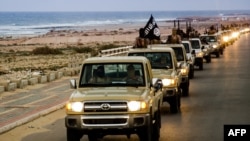As forces backed by Libya’s unity government press an offensive against Islamic State’s stronghold of Sirte, the U.S. is considering widening its engagement with the country’s fragile Government of National Accord, in a bid to oust the militants.
On Wednesday, U.S. lawmakers debated a proposal to train and equip a Libyan national security force, a move that would require a partial lifting of a U.N. arms embargo imposed on the country shortly after the 2011 ouster of leader Moammar Gadhafi.
There is broad international support for the partial lifting.
At a May meeting in Vienna attended by Secretary of State John Kerry, the U.S. was among 25 countries and world bodies that signed a communiqué saying they would support a Libyan request for the exemption.
“The idea behind the exemption to the arms embargo is to provide a uniform set of weapons that can provide relatively integrated counterterrorism capabilities to address the threat from Islamic State and other terrorist forces,” said Jonathan Winer, the State Department’s Special Envoy for Libya.
He told the Senate Foreign Relations Committee on Wednesday that the goal would be to do so in a way that was “trackable and traceable and subject to oversight.”
Senator Bob Menendez, a New Jersey Democrat, questioned whether the Libyan government is strong enough to control any arms that are supplied.
Libya’s U.N.-backed General National Congress has been trying to extend its authority since moving into Tripoli in March. But it is still facing resistance from militias loyal to a powerful general, Khalifa Haftar.
“I fear that if we are not careful, if we do not devote the same amount of time and resources to good governance,” said Senator Ben Cardin, a Maryland Democrat, that “we will simply be worsening the country’s division and repeating past mistakes that we have made elsewhere.”
Continued IS threat
The United Nations estimates there are as many as 5,000 foreign terrorist fighters working for Islamic State in Libya.
As the terrorist group began to lose ground in Iraq and Syria, it moved to take advantage of Libya’s political instability and establish an alternative stronghold.
A successful Libyan government effort in ousting Islamic State from the coastal city of Sirte is unlikely to end the terrorist group’s drive for a Libyan stronghold, said Middle East Institute analyst Charles Lister.
In a Monday article, “ISIS on Cusp of Defeat in Sirte,” he said the terrorist group may conclude that Sirte is “ultimately expendable” within its long-term plan. ISIS is an alternate acronym for the group.
“Serious attention should now be focused on preventing ISIS from regrouping further in Libya’s interior,” he said.
As the U.S. considers a plan to arm and equip Libyan forces, the U.N. has taken steps to clamp down on the spread of weapons into the hands of terrorists and other armed groups in the country.
On Tuesday, the Security Council authorized the interdiction of ships suspected of smuggling weapons into or out of Libya.





